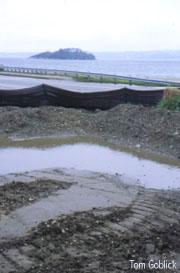Construction Site Runoff Control

Polluted storm water runoff from construction sites often enters MS4s and ultimately is discharged into local rivers and streams. Construction sites can contribute in a short amount of time, more sediment to streams than can be deposited naturally during several decades. The resulting siltation and other pollutants from construction sites can cause physical, chemical, and biological harm to our State's waters requiring dredging and destroying aquatic habitats.
To meet the requirements of this minimum control measure, the operator of a regulated small MS4 will need to at a minimum:
-
Develop and ordinance or other regulatory mechanism (with penalties to ensure compliance), that requires the implementation of proper erosion and sediment controls, and controls for other wastes, on applicable construction sites;
- Have procedures for site plan review site of construction plans that consider potential water quality impacts as well as site inspection and enforcement of control measures;
- Establish procedures for the receipt and consideration of information submitted by the public; and;
- Determine appropriate best management practices (BMPs) and measurable goals for this minimum control measure.
Recommendations for developing a successful construction site runoff control program:
-
Select BMPs that are appropriate for the local community, minimize water quality impacts, and attempt to maintain predevelopment runoff conditions;
- Provide appropriate educational and training opportunities for operators.
